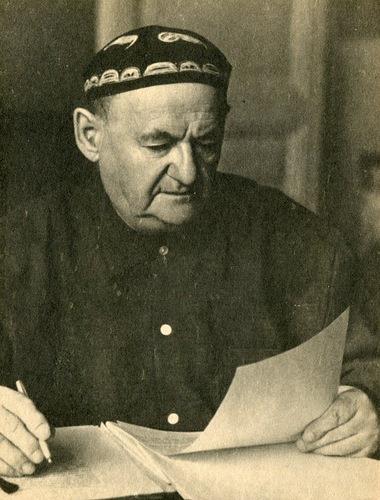
He always annoyed me. I simply adored Paustovsky’s magnificent cycle of stories about a thief cat, a rubber boat, etc. And only he spoiled everything.
For a long time I could not understand - why did Paustovsky hang out with this Fraerman? Some caricature Jew, and his name is stupid - Reuben. No, of course, I knew that he was the author of the book “The Wild Dingo Dog, or The Story of First Love,” but this only exacerbated the situation. No, I did not read the book, and was not going to. What self-respecting boy would read a book with such a snotty title if Captain Blood’s Odyssey wasn’t read for the fifth time?
And Paustovsky ... Paustovsky was cool. Really cool writer, for some reason I understood this as a child.
And when I grew up and learned about three nominations for the Nobel Prize, international fame and Marlene Dietrich, who publicly knelt in front of her beloved writer, I respected him even more.
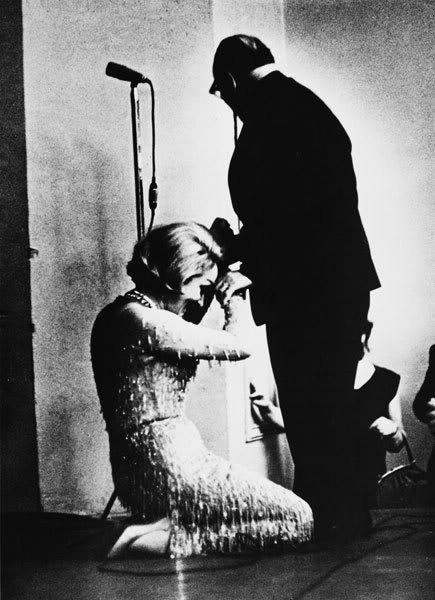
And how I respected him, when, having grown wiser, I reread his books ... Paustovsky not only saw a lot and understood a lot in this world - he was wise. And this is a very rare quality. Even among writers.
Especially among writers.
Around the same time, I understood why he was hanging out with Fraerman.
And after a recent story about the demons of the Civil War, I decided to tell you.
***
I was always surprised - why they shot piercing films about the Great Patriotic War, on which people cried, and Civil was some kind of entertaining attraction. For the most part they filmed all sorts of light-entertaining “hysteria” like “The White Sun of the Desert” or “Elusive Avengers”.
And only much later guessed - it was what in psychology is called "substitution." Behind this amusement, they hid us from the truth about what the Civil War really was.

Believe me, there are times when the truth is not a fact that you need to know.
In history, as in mathematics, there are axioms. One of them says: in Russia there is nothing worse than the Time of Troubles.
No wars, no epidemics were near. Any person plunged into documents will recoil in horror and repeat after a shocked classic who has decided to study the confusion of Pugach: “God forbid to see the Russian rebellion ...” .
The civil war was not just scary - it was something beyond.
I never tire of repeating - it was hell that invaded the earth, the breakthrough of Inferno, the invasion of demons, capturing the bodies and souls of recently peaceful inhabitants.
Most of all, it was like a mental epidemic - the country went wild and fell into a riot. For a couple of years, there was no power at all, the country was owned by small and large groups of distraught armed people who rushed aimlessly, devouring each other and filling the soil with blood.
The demons spared no one; they infected the Reds, the Whites, the poor, the rich, the criminals, the civilians, the Russians, and the foreigners. Even the Czechs, who in ordinary life are peaceful hobbits. They were already being transported home by trains, but they were also infected, and blood poured from Penza to Omsk.

I will tell only about one episode of that war, later called by diplomats "Nikolaev incident". I will not retell it in detail, I will give only the main outline of events.
There was such, as they would say today, a field commander of the “red” orientation named Yakov Tryapitsyn. Extraordinary, I must say, was a man. Former warrant officer, knocked out of the ranks of officers on the First World War, still a soldier received two St. George's Cross. An anarchist, at Civil, fought against those same whites in Samara, then went to Siberia and reached the Far East.
Once he quarreled with the command, and, dissatisfied with the decision to suspend hostilities until the arrival of the Red Army, he left with his loyal people, who had accumulated only 19. Despite this, he announced that he was going to restore Soviet power on the Amur and went on a campaign - already with 35 people.
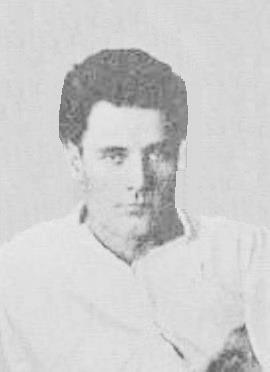
During the raid, the detachment grew, they began to occupy the village. Then the head of the garrison of Nikolaevsk-on-Amur, the actual capital of those places, the white colonel Medvedev sent a detachment led by Colonel Vits to meet Tryapitsyn. The whites decided to eliminate the reds until they gained strength.
Having met with the punishers, Tryapitsyn, declaring that he wants to avoid bloodshed, personally appeared at the location of the whites for negotiations. The man’s charisma was so great that shortly afterwards a riot broke out in Vitsa’s detachment, the colonel with the few remaining loyal fighters left for De Kastri Bay, and most of the recent white soldiers joined Trojpitsyn’s detachment.
Since there were almost no armed forces in Nikolaevsk — there were only about 300 fighters, the whites in Nikolaevsk invited the Japanese to defend the city. Those, of course, were only in favor, and soon a Japanese garrison was stationed in the city - 350 people under the command of Major Ishikawa. In addition, approximately 450 Japanese civilians lived in the city. As in all Far Eastern cities, there were many Chinese and Koreans, in addition, a detachment of Chinese gunboats wintered in Nikolaevsk, who had no time to leave on the Chinese coast of the Amur, led by Commodore Chen Shin, before freezing.
Before spring and ice, they were all locked in a city with nowhere to go.
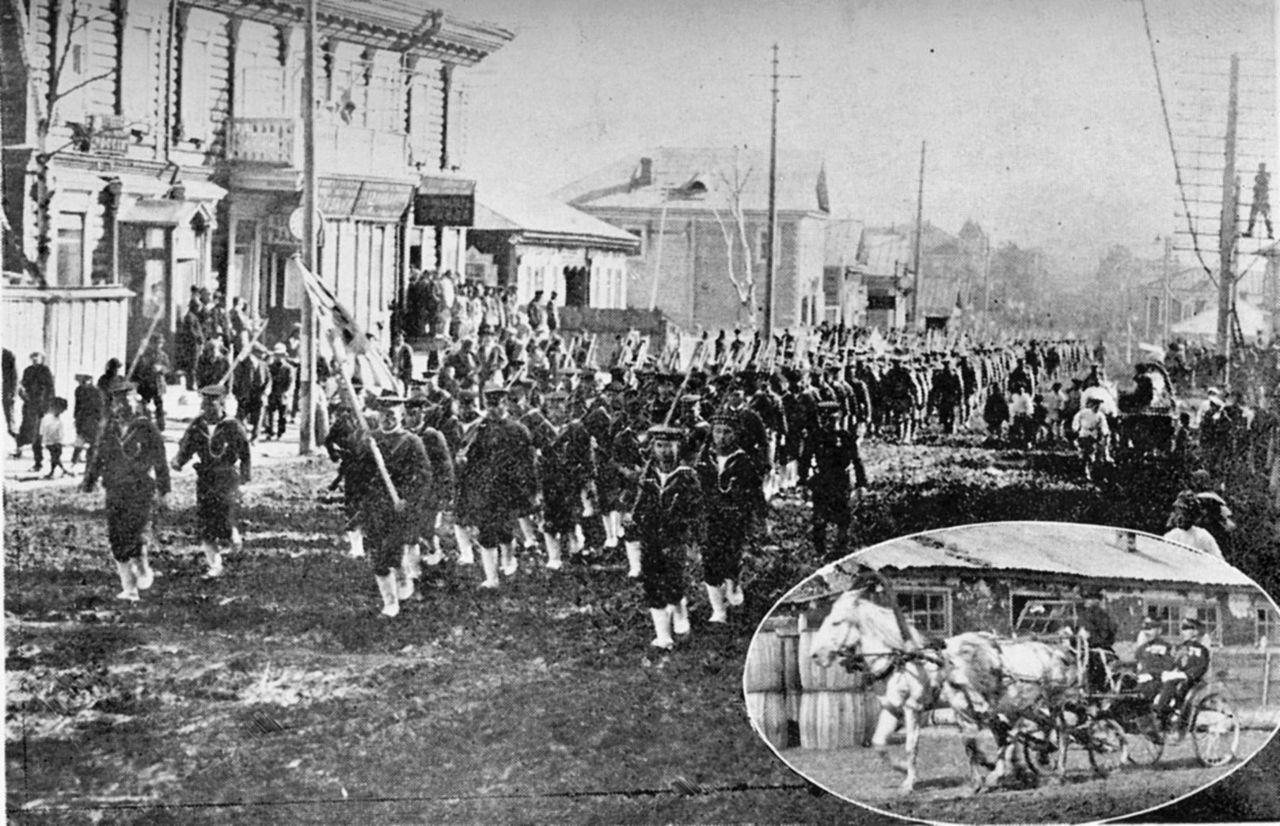
The entry of Japanese troops in Nikolaevsk-on-Amur in 1918. Major Ishikawa in a horse carriage was separately taken out.
However, soon after making an unprecedented winter transition, the 2,000-strong “partisan army” Tryapitsyna came to the city, in the columns of which was Reuben Fraerman, an infected geek, a recent student at the Kharkov Institute of Technology, who, after the third year, was sent to industrial practice on the railway in the Far East . Here he was caught by the Civil War, in which he took the side of the Reds and was now one of agitators at Tryapitsyn.
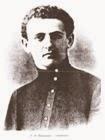
The city was besieged.
And the long and inhumanly terrible bloody dance of the demons of the Civil War began.
It all started small - with two people, the red parliamentarians Orlov-Ovcharenko and Schetnikov, who were killed by whites.
Then the Reds propagandized the garrison of the Chnyrrakh fortress, which controls the approaches to Nikolaevsk-on-Amur, and occupied the fortress, receiving artillery.
Under the threat of shelling the city, the Japanese declare their neutrality.
The Reds enter the city and occupy it almost without resistance, capturing, among other things, the entire archive of the white counterintelligence.
The disfigured corpses of Ovcharenko and Shchetnikov are exhibited in coffins in the building of the garrison assembly of the Chnyrrakh fortress. Partisans demand revenge, and according to counterintelligence lists, arrests and executions of whites begin.
The Japanese are neutral and actively communicate with the new owners of the city. Soon the condition of their being in their quarter is forgotten, fraternization begins, and armed Japanese soldiers, wearing red and black (anarchist) bows, loitering around the city, and their commander is even allowed to keep in touch with the Japanese headquarters in Khabarovsk.
But the idyll of fraternization quickly ended. On the night of March 11 to March 12, the Japanese bombard Tryapitsyin’s headquarters building with machine guns and incendiary rockets, hoping to immediately decapitate the red troops. The building was wooden, it starts a fire. The chief of staff, T.I. Naumov-Medved, was killed; the secretary of staff, Pokrovsky-Chernykh, shot himself with a flame from the exit, took Tryapitsyn himself with shot legs on a bloody sheet, and transferred him to a neighboring stone building under fire, where they organized the defense.
Shooting and fires are going on throughout the city, as it quickly turned out that not only the soldiers of the Japanese garrison took part in the armed demonstration, but also all the Japanese men who were able to hold weapons.
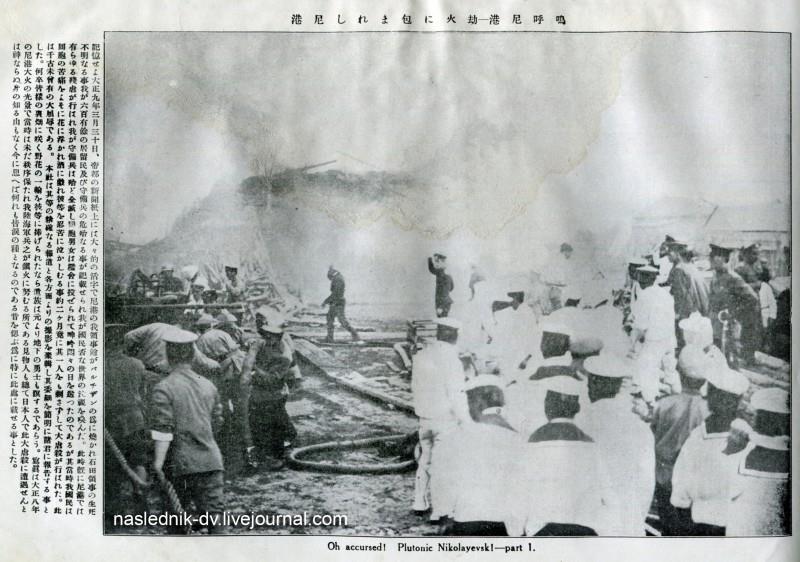
Fights go to the death, both those and others finish off prisoners.
Tryapitsyna’s personal bodyguard, a former Sakhalin convict named Lapta, with a detachment makes his way to the prison and slaughter all prisoners.

In order not to attract the attention of the Japanese with shooting, they all “end up” with knives. Since blood intoxicates no worse than vodka, distraught people killed not only the arrested whites, but also their own partisans, who were sitting in the guardhouse.
Fighting in the city takes several days, the outcome of the battle is decided by the commander of the partisan detachment of red miners Budrin, who came with his detachment from the nearest large settlement - the village of Kirby, which is 300 km away. from Nikolaevsk.
Ultimately, the Japanese were completely slaughtered, including the consul, his wife and daughter, and the geisha from local brothels. Only 12 Japanese women who were married to the Chinese were saved - they, along with the city Chinese, took refuge in the gunboats.
Tryapitsyna’s mistress Nina Lebedeva, a maximalist Socialist-Revolutionary who was exiled to the Far East as a gymnasium at the age of 15, was appointed the new chief of staff of the partisan formation for participating in the assassination attempt on the Penza governor.

Wounded J. Tryapitsyn with his common-law wife N. Lebedeva.
After the defeat of the Japanese, the Nikolaev commune is declared in the city, the money is canceled and the real hunt for the bourgeoisie begins.
Once launched, this flywheel is almost impossible to stop.
I will save you from the bloody details of what is happening in Nikolaevsk next, I will only say that the result of the so-called. The "Nikolaev incident" was the death of several thousand people.
These are all together, different: red, white, Russian, Japanese, intellectuals, Hunhus, telegraphists, convicts and various other thousands of people.
And the complete destruction of the city - after the evacuation of the population and the departure of the detachment Tryapitsyna from old Nikolaevsk, nothing remained.
Nothing.
As it was later calculated, out of 1165 residential buildings of various types, 21 buildings (stone and semi-stone) were blown up, 1109 wooden houses were burnt, thus 1130 residential buildings were destroyed in a circle, which is almost 97% of the total housing stock of Nikolaevsk.
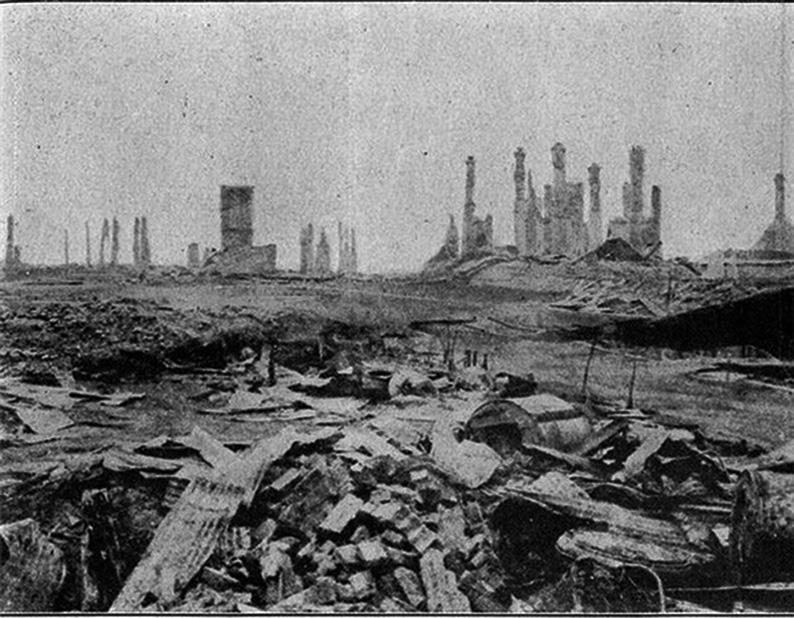
Before leaving, distraught with blood, Tryapitsyn sent a radiogram:
Comrades! Last time we speak with you. We leave the city and the fortress, blow up the radio station and leave for the taiga. The entire population of the city and the district was evacuated. Villages along the coast of the sea and in the lower reaches of the Amur have been burned. The city and the fortress were destroyed to the ground, large buildings were blown up. Everything that could not be evacuated and that could be used by the Japanese, we destroyed and burned. In the place of the city and the fortress there were only smoking ruins, and our enemy, having come here, will find only piles of ash. We're leaving…
You ask - what about Fraerman? There is no evidence of his participation in atrocities, rather the opposite.
A crazy playwright named Life decided that it was at that moment that the first love should happen to a former Kharkov student. Of course, unhappy.
Here is what Sergey Ptitsyn wrote in the recollections of partisans:
“Rumors about the alleged terror penetrated the population, and people who did not receive passes (for evacuation - BH), swept around the city in horror, looking for all kinds of means and opportunities to get out of the city. Some young, beautiful women from the bourgeoisie and the widows of the executed White Guards offered themselves to be partisans' wives to help them get out of the city, entered into relations with more or less responsible workers to use them for their salvation, and threw themselves into the arms of Chinese officers from gunboats, to be saved with their help.
Fraerman, with danger to his own life, saved the priest’s daughter Zinaida Chernykh, helped her take refuge as his wife, and later, having come to her in a different setting, was not recognized for her husband. ”
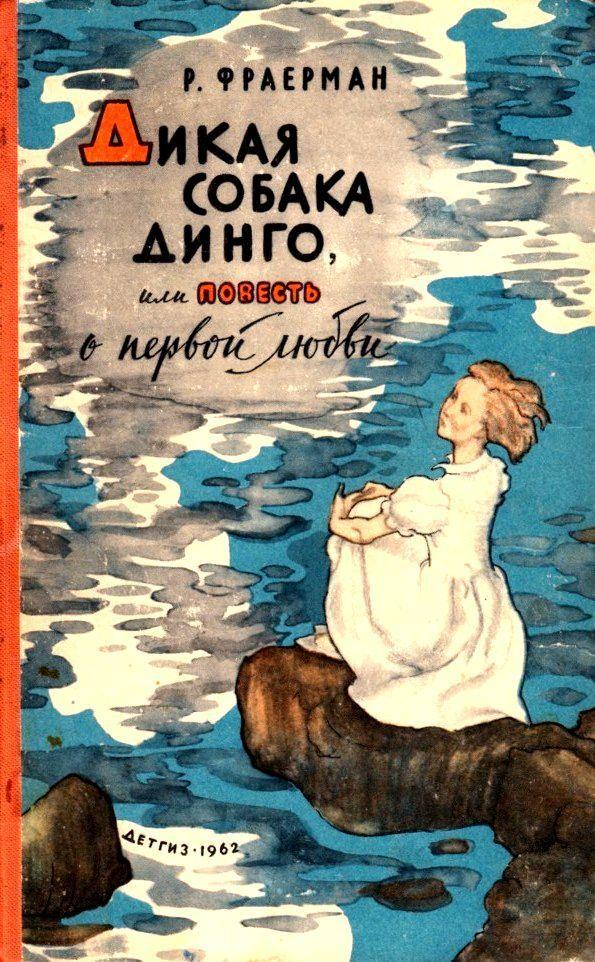
There is no evidence of his involvement in atrocities.
But he was there and saw it all. From the beginning - and almost to the end.
***
Tryapitsyna, Lebedev, Lapta, and twenty other people who distinguished themselves in the destruction of Nikolaevsk, “finished” their own partisans, not far from the very village of Kirby, now - the village named after Polina Osipenko.
The successful conspiracy was led by a former lieutenant, and now a member of the executive committee and chief of the regional police, Andreev.
They were shot by the sentence of a fleeting court long before they received any instructions from Khabarovsk, and especially Moscow.
Just because after the transition of a certain trait people must be killed - that according to human, that according to God's laws, at least out of a sense of self-preservation.
Here it is, the shot leadership of the Nikolaev commune:
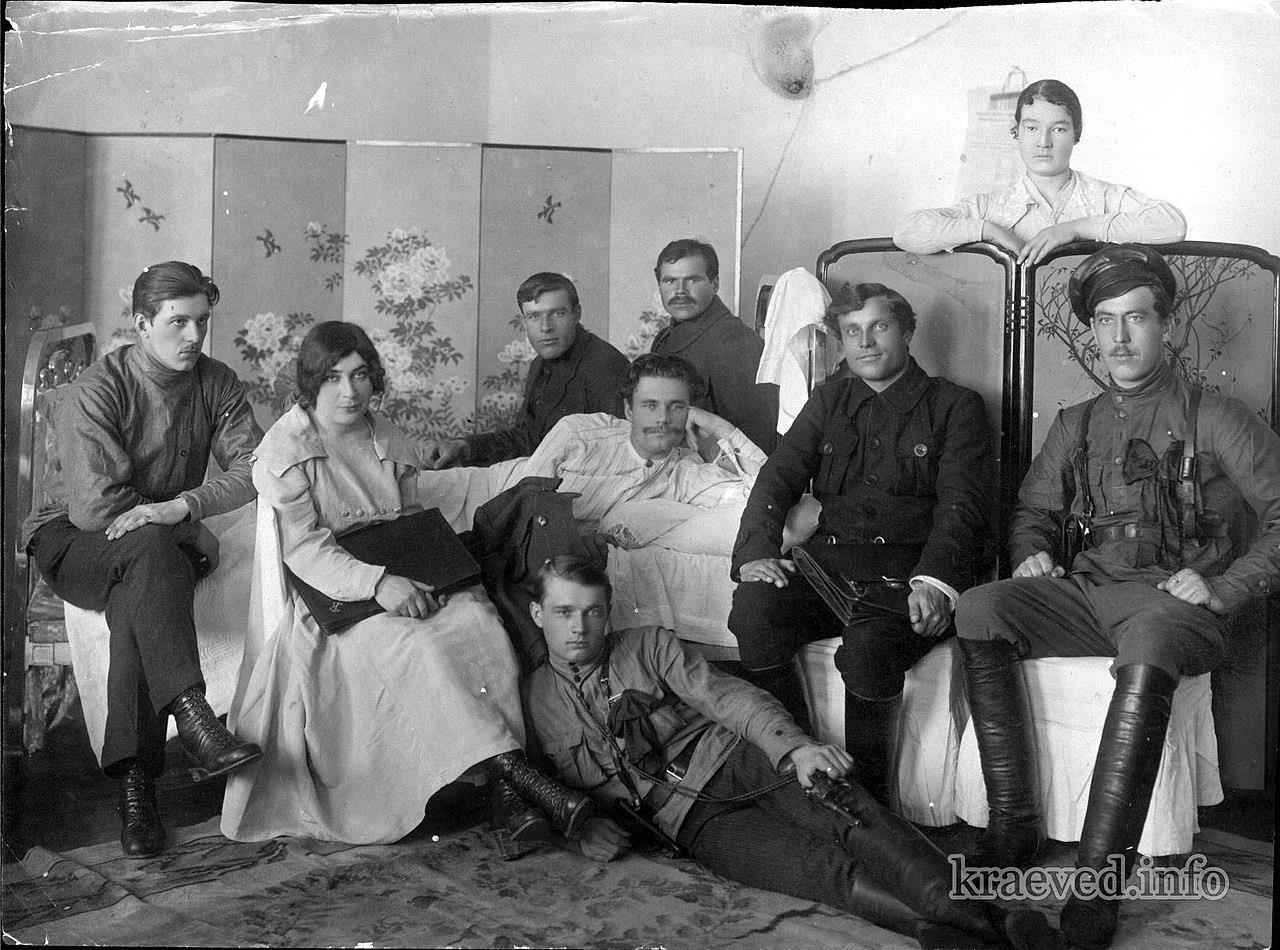
Fraerman did not participate in the reprisal against the former commander - shortly before the evacuation, he was appointed commissar of the partisan detachment formed to establish Soviet power among the Tungus.
“With this partisan detachment, ” the writer himself recalled in his memoirs, “I have traveled thousands of kilometers through impassable taiga on deer ...” The campaign took four months and ended in Yakutsk, where the detachment was disbanded, and the former commissioner began working in the newspaper "Lensky Communard".
***
They lived in the forests of the Meschera together - he and Paustovsky.
He, too, saw a lot of things in the Civil - in occupied Kiev, and in the independent army of the hetman Skoropadsky, and in the red regiment recruited from the former Makhnovists.
More precisely, the three of us, because a very close friend Arkady Gaidar constantly came to them. This was even told in Soviet filmstrips.

That same Gaidar, who once wrote in his diary: "People who I killed in my childhood dreamed . "
There, in the untouched forests and lakes of the Meschera, they cleaned themselves.
Smelted black demonic energy into chased lines of rare purity and tenderness.
Gaidar wrote “The Blue Cup” there - the most crystal work of Soviet children's literature.
Fraerman was silent for a long time, but then he broke through, and in a week he wrote "The Wild Dog of the Dingo, or The Story of First Love."
The story, which takes place in Soviet times, but the city on the Amur River, described in detail in the book, is very recognizable.
This is the same pre-revolutionary, long time ago nonexistent Nikolaevsk-on-Amur.
The city they erased.
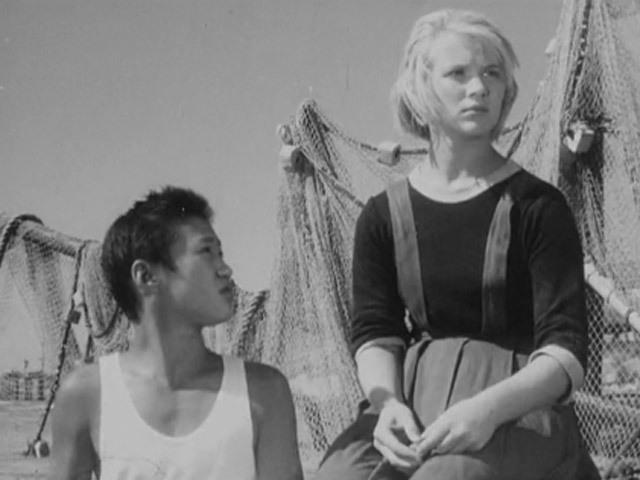
Paustovsky then wrote like this: “The expression“ good talent ”is directly related to Fraerman. This is a good and pure talent. Therefore, Fraerman managed with special care to touch such aspects of life as his first youthful love. Fraerman’s book, The Wild Dog of the Dingo, or A Tale of First Love, is a light-filled, transparent poem about love between a girl and a boy .
They generally lived well there. Somehow right, kind and fun:
Gaidar always came with new playful verses. Once he wrote a long poem about all the youthful writers and editors of the Children's Publishing House. This poem was lost, forgotten, but I remember the funny lines devoted to Fraerman:
In the skies over the entire universe
We languish with eternal pity
Unshaven, inspired
Forgiving Reuben ...
They allowed themselves to release their crushed demons only once.
In 1941
You probably know about Gaidar, Paustovsky wrote to Fraerman from the front: “I spent a month and a half on the Southern Front, almost all the time, not counting four days, on the line of fire ...”.
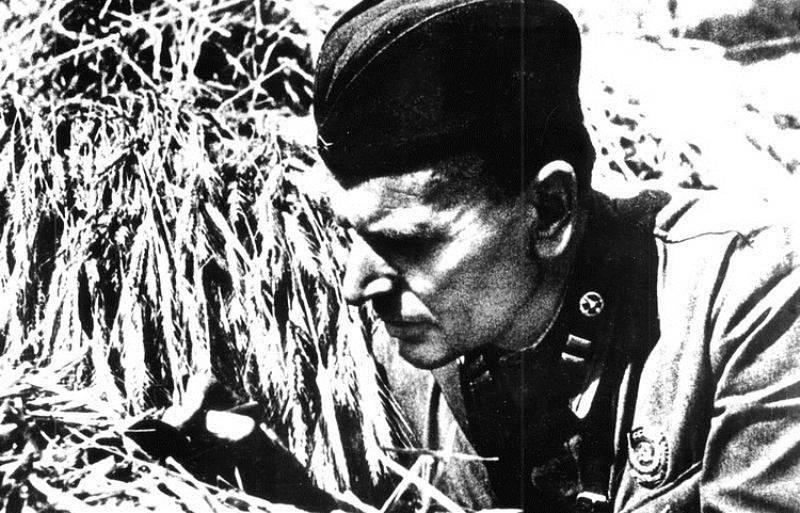
Paustovsky on the Southern Front.
And Fraerman ... Fraerman, who was already the sixth dozen, left in the summer of the 41st in the Moscow militia as an ordinary soldier. He didn’t hide from the front line, therefore, he was seriously wounded in 1942, after which he was commissioned.
The former Kharkov student and partisan agitator was destined for a long life - he lived 80 years.
And every day, as Chekhov the slave, squeezed out of himself this black demon of the Civil War.
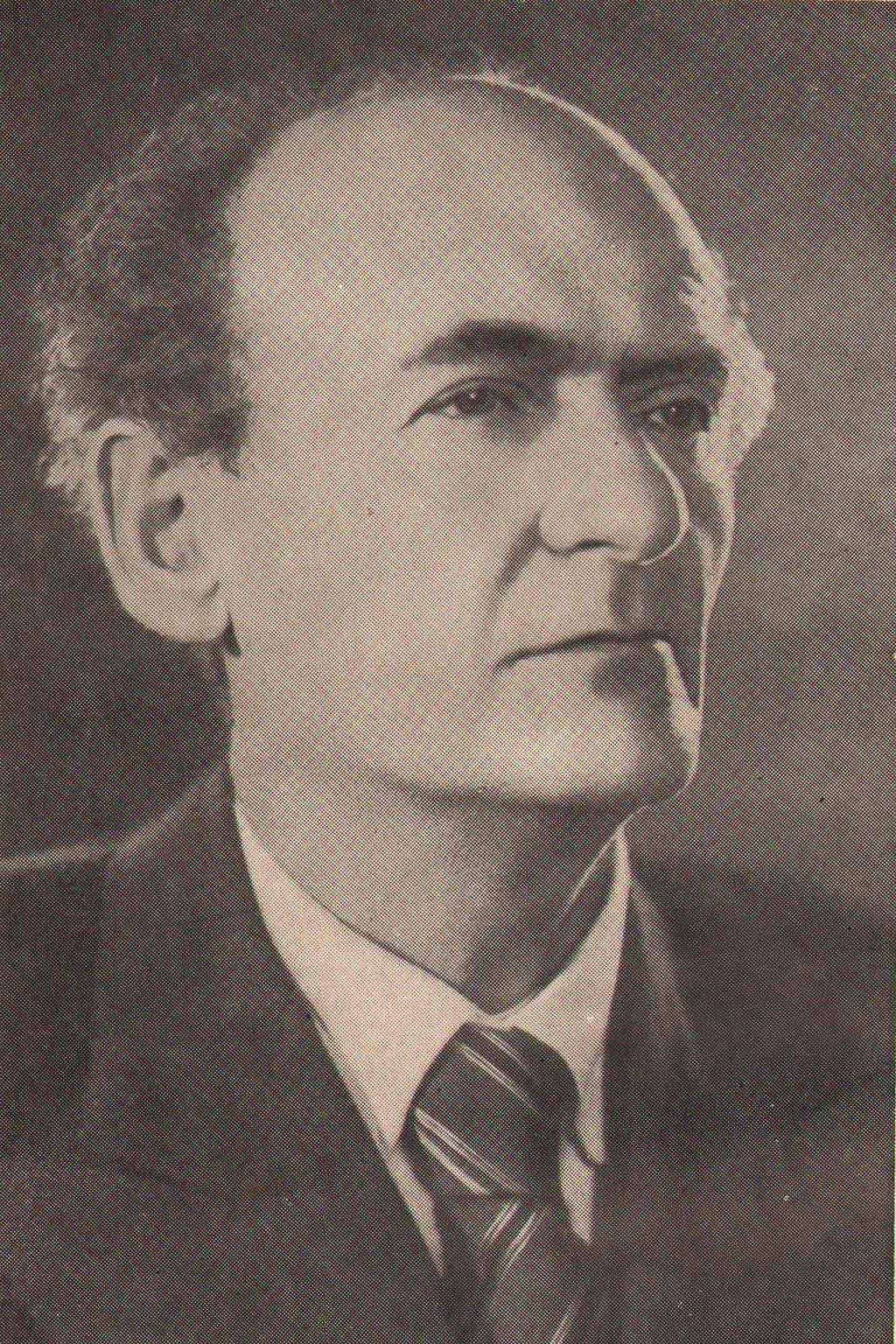
Unlike his friends Paustovsky and Gaidar, he was not a great writer. But, according to the recollections of many, Reuben Fraerman was one of the brightest and kindest people whom they met in life.
And quite differently after that, the lines of Reuben Isaevich sound:
“To live one’s life with dignity on earth is also a great art, perhaps even more complex than any other skill ...”
PS And you still read “Cat-Thief”, if not already.